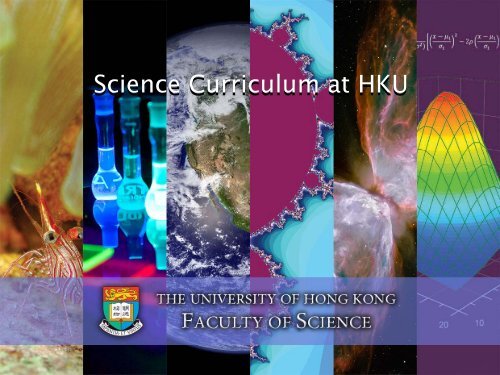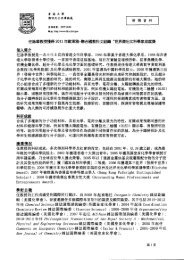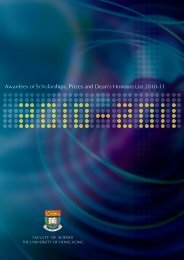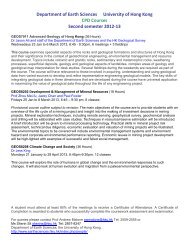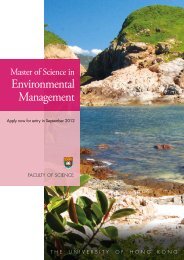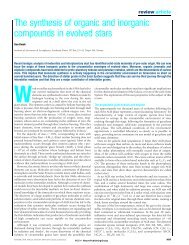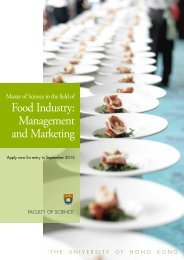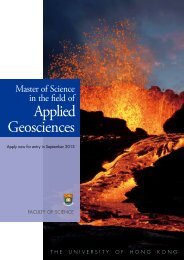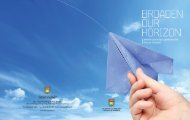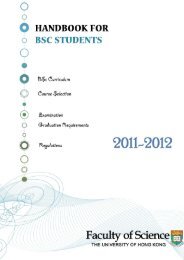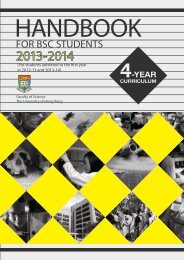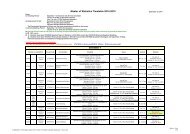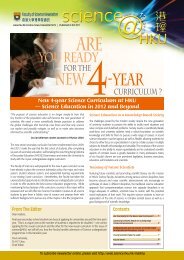6901 BSc Admission Talk Presentation File - Faculty of Science, HKU
6901 BSc Admission Talk Presentation File - Faculty of Science, HKU
6901 BSc Admission Talk Presentation File - Faculty of Science, HKU
- No tags were found...
Create successful ePaper yourself
Turn your PDF publications into a flip-book with our unique Google optimized e-Paper software.
<strong>Science</strong> Curriculum at <strong>HKU</strong>
Reformed <strong>Science</strong> Curriculum
What is a University?• The mission <strong>of</strong> a university is to develop thestudent as a whole person, to prepare him/herhow to think and for life-long self learning• <strong>HKU</strong> is NOT a trade school. The goal <strong>of</strong> auniversity is not to provide vocational training• University is NOT a diploma mill. You are herenot just to get a degree or a certificate, but tolearn and be educated
<strong>Science</strong> Education• It is sometimes not just the contents but also the trainingwhich you go through that counts for your future career• Helps students to develop a scientific mind that is strong in– analytical thinking– quantitative and logical reasoning• Equips students with scientific skills <strong>of</strong> carrying out difficultand delicate tasks to obtain innovative solutions for novelproblems in science related or non-science related careers
Modern <strong>Science</strong>• <strong>Science</strong> is not a collection <strong>of</strong> facts, but is a processfor the creation <strong>of</strong> knowledge• Many new scientific advancements and emergingscience disciplines are results <strong>of</strong> synthesis <strong>of</strong> ideasin different disciplines– Human Genome Project– Environmental <strong>Science</strong>– Astrobiology, Bioinformatics, ...• Undergraduate broad-based science training is animportant foundation for the training <strong>of</strong> futurescientists
Why <strong>Science</strong> at<strong>HKU</strong>?Biological <strong>Science</strong>sChemistryEarth <strong>Science</strong>sMathematicsPhysicsStatistics & Actuarial <strong>Science</strong>
Our Pr<strong>of</strong>essorial staffStaff NumberAcademic staff- Pr<strong>of</strong>essoriate 120- Research & Academic Support 132Non-academic Staff- Administrative & Support 63- Technical 78• Quality teaching with emphasis on the interaction between teachers and students• A low undergraduate students to teacher ratio 12 : 1
<strong>6901</strong> Bachelor <strong>of</strong> <strong>Science</strong>‣ One entry in application for a choice <strong>of</strong>15 <strong>Science</strong> majors
Major and Minor System• No quota for any particular science major• But quota and timetabling restrictions may apply to 2 nd major or minor(s)• Minors and second majors available in <strong>Science</strong>, Architecture, Arts, Social<strong>Science</strong>s, Business & Economics, Education, Engineering, and Medicine
Curriculum Structure
<strong>Science</strong> Foundation Courses• 2 integrated approach compulsory courses for ALL students• Provide sufficient background for all majors in the <strong>6901</strong> programme
4-year <strong>6901</strong> <strong>BSc</strong> Programmecomponent courses no. <strong>of</strong> courses(credits)CompulsorySpecializationCommon CoreEnglishChinese<strong>Science</strong> Major6 courses (36)2 courses (12)1 course (6)16 courses (including two<strong>Science</strong> Foundation coursesand a capstone course) (96)%22.5%40%ElectivesElectives, or coursesleading to a minor ora 2nd major15 courses (90) 37.5%Total 40 courses (240) 100%* A student usually takes 10 courses per year, 6 credits per course
Example <strong>of</strong> <strong>6901</strong> Programme Structure By YearCC - Common Core CoursesSF - <strong>Science</strong> Foundation CoursesYr 4CapstoneMajor Major Major Major MajorYr 3 CC CC Chi Major Major MajorYr 2 CC CC Eng 2 Major Major MajorYr 1 CC CC Eng 1 SF1 SF2 Major MajorNote: different distributions <strong>of</strong> courses over the years are possible
Academic Advisory System• We understand that selection <strong>of</strong> major is a very important decision forstudents. Some students may have already decided what major theywant to take before they are admitted, while some may want toexplore multiple options before making a decision.• Our <strong>Faculty</strong>’s advisors will advise you on the choice <strong>of</strong> major, courserequirements, and possible major-minor combination to suit yourinterests, ability, and career aspirations.
The Common <strong>Admission</strong> Policy isSimple and Flexible!<strong>HKU</strong> <strong>Science</strong> is the first to introduce this policysince 2007• No quota for any <strong>Science</strong> major• Complete freedom in choosing any<strong>Science</strong> major•• Declare major by the end <strong>of</strong> thesecond year• Second major* and minor* options in<strong>Science</strong> and non-<strong>Science</strong> faculties* subject to minimum academic requirement imposed byindividual faculty/major
Diverse Learning Experiences
Diverse Learning Experiences
Early Research ExperiencesOverseas Research Fellowship (ORF) Scheme 2011-2012Project TitleInvestigation into the virulence <strong>of</strong> community‐associated methicillin‐resistantstaphylococcus aureus (CA_MRSA) isolates from Guangdong using the caenorhabditiselegans infection modelValuation on Apple stock optionsMapping the spatial distribution <strong>of</strong> PAHs in the nebula <strong>of</strong> NGC 1275Developing slow control system in the study <strong>of</strong> liquid xenon and neutrinosTheoretical modeling <strong>of</strong> ultra‐compact binary system and gravitational wave sourcesDevelopment <strong>of</strong> a formula for a body fat reducing functional foodAccelerator theories and beam dynamics analysisFractal globule simulation for three‐dimensional folding structure <strong>of</strong> human genomeExplore microRNA sequencing data for leukemia cellsSupervisorDr K Zhang, University <strong>of</strong> CalgaryPr<strong>of</strong> S Rao Jammalamadaka, University <strong>of</strong> California, Santa BarbaraDr Y Ohyama, Institute <strong>of</strong> Astronomy and Astrophysics, Academia SinicaPr<strong>of</strong> L Yang, University <strong>of</strong> IllinoisPr<strong>of</strong> K W Wu, Mullard Space <strong>Science</strong> LaboratoryDr C F Chau, National Chung Hsing UniversityPr<strong>of</strong> E Tsesmelis, CERN‐ European Organization for Nuclear ResearchDr N Chemiavsky, Broad Institute <strong>of</strong> MIT and HarvardPr<strong>of</strong> T P Speed, University <strong>of</strong> California, Berkeley
InternationalExposures• Over 100 overseas universities haveexchange agreement with <strong>HKU</strong>• 123 students traveled abroad foroverseas exchange in 2011-2012• Overseas Research Fellowship, Fieldtrips, Internship, Service Learning
Earth <strong>Science</strong>s Field Camp in CyprusLocal Geology Field WorkEnvironmental <strong>Science</strong> Field Course in JapanSummer Course on Sustainable Food at The University <strong>of</strong> British ColumbiaEcology Field Trip in Kenya
Broad Further Study Options• Undergraduate study is only a foundation toscientific research and pr<strong>of</strong>essional scientificcareer• Postgraduate studies also possible in medicalsciences, engineering, computing,pharmacology, materials sciences, economicsand business• 23% <strong>of</strong> <strong>Science</strong> graduates in 2010 pursuedfurther studies (Overall % <strong>of</strong> <strong>HKU</strong> – 19%)Some <strong>of</strong> the institutionsour students wentPrincetonStanfordOxfordCambridgeChicagoMcGillColumbiaMichiganMITTexasCaltechUC San DiegoSLACUCLAIllinoisSBU
Overall Employment SituationCivil ServicesWide Career ProspectsAgriculture, Fisheries and Conservation Dept., Environmental Protection Dept., Food and Environmental HygieneDept., Hospital Authority, Census and Statistics Dept., Education Bureau, Government Lab, Hong Kong ObservatoryGeotechnical IndustriesFood IndustriesGreen and Environmental IndustriesComputer IndustriesCommercemining industry, soil and water specialists, site formation works, foundation construction, tunnelingnutritionist, quality assurance <strong>of</strong>ficer, health promoter, medical salesBiotech and pharmaceutical IndustriesTesting LabsTechnical Managementscientific computing, s<strong>of</strong>tware developmentpolicy advisor, environmental consultant, ecotourism, conservation groups,green energy R&Dproduct consultants, business and management analysts, researchassistants, medical technologists, scientific <strong>of</strong>ficerspr<strong>of</strong>essional chemists in government and commercial labs, environmental labs using eco‐toxicology, bio‐remediation,pollution control and environmental protectionindustrial plant management, habitats and ecosystems management, mineral and rare‐earthresource management, slope safety management, hazard planning and management, riskmanagementbanking, finance, accounting, insuranceEngineeringaerospace, communications, energyR&D scientist; Technical Marketing; Education; Museums; Journalism; Social Services etc.
<strong>Admission</strong> Requirements
<strong>Admission</strong> requirementsFor HKDSE Students<strong>HKU</strong> General Entrance Requirements:*For admission to <strong>6901</strong> <strong>BSc</strong> programme, one <strong>of</strong> theElective subjects must be Biology, Chemistry, Physics,Combined <strong>Science</strong> or Integrated <strong>Science</strong>
Programme‐specific <strong>Admission</strong> RequirementsProgrammeTotal No. <strong>of</strong> elective(s)required and the levelrequirement(s)Specific subjectrequirementsAdditional subjectrequirementsAdditional levelrequirements<strong>6901</strong> Bachelor<strong>of</strong> <strong>Science</strong>6119 Bachelor <strong>of</strong>Education &Bachelor <strong>of</strong><strong>Science</strong>2Level: 3One <strong>of</strong> the following-Biology-Chemistry-Physics- Combined <strong>Science</strong>- Integrated <strong>Science</strong>NilNil6729 Bachelor<strong>of</strong> <strong>Science</strong> inActuarial<strong>Science</strong>NilExtended Module1 or Module 2 <strong>of</strong>MathematicsMathematics:Level 4Extended Module<strong>of</strong> Mathematics:Level 4
Selection Criteria <strong>of</strong> <strong>6901</strong>Selection Criteria <strong>of</strong> <strong>6901</strong>for HKDSE students admitted in 2013Minimum Requirement•332233 in 4 core and 2 elective subjects (4+2x)•One <strong>of</strong> the 2x must be a <strong>Science</strong> Subject (Biology, Chemistry,Physics, Combined <strong>Science</strong>, and Integrated <strong>Science</strong>).<strong>Admission</strong> Principle – Best 5•Must include English, Mathematics, Best <strong>Science</strong> Subject•Plus best 2 <strong>of</strong> the remaining subjects, including M1/M2•Heavier weight for <strong>Science</strong> Subjects, Math, and M1/M2•Aptitude test to differentiate borderline students•Students under the Principal’s Nomination Scheme andstudents with outstanding performance in other attributes suchas extra-curricular activities, sports, international competition,leadership, etc., will be considered separately
2012 JUPAS <strong>Admission</strong> GradeCurriculumTotal Score <strong>of</strong> Best 5 HKDSE SubjectsHighest Score Lowest Score<strong>6901</strong> BSC 33 246729 BSC(AC) 35 286119 BED&BSC 27 22Note: admission is not necessarily based onexamination results alone; the examination results<strong>of</strong> applicants admitted to each programme varyfrom year to yearThe HKDSE “level/grade to score” scaleLevel 5** 5* 5 4 3 2 1Score 7 6 5 4 3 2 1
2012 <strong>Admission</strong> DataNo. <strong>of</strong> students admitted to 4-year curriculum in 2012<strong>6901</strong> <strong>BSc</strong> 6729 <strong>BSc</strong>(AC) 6119 BEd&<strong>BSc</strong>No. <strong>of</strong> JUPAS students 330 (75%) 45 (66%) 10 (48%)No. <strong>of</strong> Non‐JUPAS students 111 (25%)‐ 50 mainland;‐ 32 local;‐ 29 international23 (34%)‐22 mainland;‐1 localTotal no. <strong>of</strong> students admitted 441 68 21No. <strong>of</strong> Second Year studentsadmitted to 3‐year curriculumthrough the Direct <strong>Admission</strong>sScheme37 ‐ ‐11 (52%)‐2 mainland;‐9 local andinternational
Quota for 2013• Quota for <strong>6901</strong> <strong>BSc</strong> programme (JUPAS + Local Non‐JUPAS): 358(Separate Quota for mainland and international students)• Quota for 6729 <strong>BSc</strong>(AC) programme: 70• Quota for 6119 BEd&<strong>BSc</strong> programme: 25• Quota for Direct <strong>Admission</strong>s Scheme (Second Year students admitted to 3‐yearcurriculum <strong>6901</strong> programme): 70
<strong>Science</strong> Entrance ScholarshipsHKDSE Results(Total Score in best 5 subjectsin Category A or C)Score <strong>of</strong> 35(for JUPAS - <strong>6901</strong> <strong>BSc</strong> programme)No. <strong>of</strong> Level 5**Scholarship Amount(HK$)7 x Level 5** $ 30,0006 x Level 5** $ 20,0005 x Level 5** $ 15,000Score <strong>of</strong> 34 -- $ 10,000Score <strong>of</strong> 33 -- $ 8,000Score <strong>of</strong> 32 -- $ 6,000Score <strong>of</strong> 31 -- $ 4,000Score <strong>of</strong> 30 -- $ 2,000#The results are based on one sitting only.Students must be non-HKDSE repeaters andmust fulfill the minimum University entrancerequirements.The HKDSE “level/grade to score” scaleLevel 5** 5* 5 4 3 2 1Score 7 6 5 4 3 2 1
University FinancialAssistance‣ Supplementing Government financialassistance schemes at <strong>HKU</strong>:University Financial Assistance Scheme‣ Grants and Interest-free loans managed bythe <strong>HKU</strong> <strong>of</strong>fering to students who:1. anticipate difficulties in balancing their budget2. encounter unexpected financial difficulties3. need support for overseas travels/ studies
Whole-Person EducationAs a <strong>HKU</strong> <strong>Science</strong> student, you will be educated:•to learn how to learn•to reason quantitatively and to understand scientific aspects <strong>of</strong> complexissues•to tackle novel situations•to work and communicate effectively with others within and outside thescience disciplines•to develop as an all-rounded individual
University Life
http://www.scifac.hku.hk/community/enrichment/jsihttp://www.facebook.com/jsi.hku
Ask <strong>Admission</strong>on facebookwww.facebook.com/<strong>6901</strong>.hku<strong>Faculty</strong> <strong>of</strong> <strong>Science</strong>, <strong>HKU</strong>Email: science@hku.hkWebsite: www.scifac.hku.hkPhone: 2859 2683
Bonus Slides
Nurturing the Young for 100 Years
2012 is a new Page for <strong>HKU</strong><strong>HKU</strong> Main Building in 1912Centennial Campus in 2012
An International University
OverviewStudent <strong>Admission</strong>*入 學 新 生 人 數 *(2011 / 2012)Postgraduate (Research and Taught)研 究 生 ( 研 究 式 及 修 課 式 )Male男Female女All總 計% International國 際 化 百 分 比2,439 2,818 5,257 46.7%Undergraduate本 科 生 1,750^ 1,901^ 3,651^ 24.7%All總 計 4,189^ 4,719^ 8,908^ 37.6%Student Enrollment*整 體 在 學 人 數 *(2011 / 2012)Postgraduate (Research and Taught)研 究 生 ( 研 究 式 及 修 課 式 )5,597 5,946 11,543 44.6%Undergraduate本 科 生 5,489^ 6,001^ 11,490^ 22.3%All總 計 11,086^ 11,947^ 23,033^ 33.5%Graduates畢 業 生(2010 / 2011)Postgraduate (Research and Taught)研 究 生 ( 研 究 式 及 修 課 式 ) 2,222 2,509 4,731 41.3%Undergraduate本 科 生 1,561 1,896 3,457 15.5%All總 計 3,783 4,405 8,188 30.4%* Excluding exchange-in and visiting students on all levels <strong>of</strong> studies. Students on outreach programmes are included.* 包 括 外 展 學 位 課 程 學 生 , 並 不 包 括 所 有 課 程 之 交 換 生 及 訪 問 學 生 。^ With the implementation <strong>of</strong> the new 4-year undergraduate curriculum in 2012–2013, an extra cohort <strong>of</strong> around 3,400 first-year students were admitted to theUniversity. The cohort was not reflected in these figures because they refer to a different year.^ 四 年 制 本 科 課 程 於 二 零 一 二 至 二 零 一 三 年 度 正 式 實 行 , 此 數 字 僅 計 算 二 零 一 一 至 二 零 一 二 年 度 的 本 科 生 總 數 , 未 有 包 括 約 3,400 名 在 新 學 制 下 入 讀 港 大 的 新 生 。
Staff +教 職 員+(2011 / 2012)All總 計% International國 際 化 百 分 比Pr<strong>of</strong>essoriate教 授1,041 55.8%Research and Academic Support研 究 及 教 學 支 援1,980 -Administrative and Support行 政 及 支 援 2,410 -Technical技 術All總 計+ Excluding visiting and honorary staff.+ 教 職 員 人 數 不 包 括 客 座 及 名 譽 教 職 員 。1,086 -6,517 -StaffPr<strong>of</strong>iles
Student Pr<strong>of</strong>iles<strong>Faculty</strong>學 院Architecture建 築Arts文Business and Economics經 濟 及 工 商 管 理Dentistry牙 醫Education教 育Engineering工 程Law法 律Medicine醫<strong>Science</strong>理Social <strong>Science</strong>s社 會 科 學All Faculties全 校 學 院 合 計In % Distribution分 佈 百 分 比Student Pr<strong>of</strong>iles 2011 / 2012 (In Headcounts) 二 零 一 一 / 二 零 一 二 年 度 學 生 人 數 總 覽Enrollment <strong>of</strong> Students on All Programmes 所 有 課 程 就 讀 學 生 人 數Postgraduate (Research and Taught)研 究 生 ( 研 究 式 及 修 課 式 )UGC-funded Self-fundedProgrammes Programmes Total教 資 會 資 助 課 程 自 資 課 程 總 數Undergraduate本 科 生UGC-funded Self-fundedProgrammes Programmes教 資 會 資 助 課 程 自 資 課 程Total總 數UGC-fundedProgrammes教 資 會 資 助 課 程All Levels全 部 課 程Self-fundedProgrammes自 資 課 程344 451 795 353 31 384 697 482 1,179214 573 787 1,259 - 1,259 1,473 573 2,04672 1,792 1,864 1,998 30 2,028 2,070 1,822 3,89263 111 174 267 - 267 330 111 441869 897 1,766 693 - 693 1,562 897 2,459511 1,329 1,840 1,506 6 1,512 2,017 1,335 3,352230 699 929 399 198 597 629 897 1,526620 654 1,274 1,675 382 2,057 2,295 1,036 3,331532 304 836 1,539 - 1,539 2,071 304 2,375242 1,036 1,278 930 224 1,154 1,172 1,260 2,4323,697 7,846 11,543 10,619 871 11,490 14,316 8,717 23,03316.1% 34.1% 50.1% 46.1% 3.8% 49.9% 62.2% 37.8% 100%Total總 數
International StudentsEnrollment <strong>of</strong> International Students on All Programmes(Excluding Exchange-in Students)所 有 課 程 國 際 學 生 就 讀 人 數 ( 不 包 括 交 換 生 )Postgraduate(Research and Taught)研 究 生( 研 究 式 及 修 課 式 )% Postgraduate(Research and Taught)研 究 生( 研 究 式 及 修 課 式 )百 分 比Country國 家Undergraduate本 科 生All Levels全 部 課 程% Undergraduate本 科 生 百 分 比Mainland China中 國 內 地 3,717 1,333 5,050 72.2% 52.0% 65.5%%AllLevels全 部 課 程 百 分 比Other Asian Countries其 他 亞 洲 國 家467 496 963 9.1% 19.3% 12.5%Australia and New Zealand澳 洲 及 紐 西 蘭113 110 223 2.2% 4.3% 2.9%European Countries歐 洲 國 家 458 379 837 8.9% 14.8% 10.9%North American Countries北 美 國 家Others (e.g. Central andSouth America, African Countries)其 他 ( 例 如 : 中 美 及 南 美 、非 洲 國 家 )All Countries全 部 國 家 總 計340 231 571 6.6% 9.0% 7.4%51 15 66 1.0% 0.6% 0.9%5,146 2,564 7,710 100% 100% 100%
List <strong>of</strong> Majors and Minors
Astronomy• The only university inHong Kong to <strong>of</strong>fer thisspecialty• Strong space astronomyand astrophysicsresearch groups• Focuses on boththeoretical andobservational astronomySample Courses*:Fundamental physics; Planetary geology;Mechanics; Electricity and magnetism;Modern physics; Observationalastronomy; The physical universe;Principles <strong>of</strong> astronomy; Stellar physics;Planetary science; Cosmology; Generalrelativity; Interstellar medium; Stellaratmospheres; Directed studies; Project;Internship; Research methods in physics* Sample courses for ALL majors are subjectto changes• Wide range <strong>of</strong> coursesfrom the very small scale(i.e. subatomic particles)to the large scale (i.e.cosmology)• Research groups onCondensed MatterPhysics, QuantumComputing, ExperimentalParticle PhysicsSample Courses*:Problem solving in physics; Electricity andmagnetism; Heat and waves; Modernphysics; Classical mechanics; Quantummechanics; Electromagnetism; Statisticalmechanics & thermodynamics; Laser andSpectroscopy; Physics <strong>of</strong> Nanomaterials;Waves and Optics; Computational Physics;Data and modelling; Solid State Physics;Atomic and Nuclear Physics; Experimentalphysics; Directed studies; Project;Internship; Research methods in physicsPhysics
MathematicsMathematics/Physics• Mathematics ‐ abstract,precise, logical reasoning• Electives available forboth pure and appliedmathematicsSample Courses*:Linear algebra; Multivariable calculus;Algebra; Analysis; Functions <strong>of</strong> a complexvariable; Mathematical laboratory andmodeling; Development <strong>of</strong> mathematicalideas; Mathematics seminar; Matrixtheory and its applications; Numbertheory; Differential equations; Discretemathematics; Numerical analysis;Probability theory; Directed studies inmathematics; Operations research;Optimization; Queueing theory andsimulation; Financial calculus; Gametheory and strategy; Functional analysis;Partial differential equations; Geometry;Differentiable manifolds; Scientificcomputing; Real analysis; Geometrictopology; Project; Internship• Provides students with asolid foundation in bothphysics and mathematics• This major is cateredespecially for studentsinterested in the moretheoretical aspects <strong>of</strong>physicsSample Courses*:University mathematics; Fundamentalphysics; Linear algebra; Multivariablecalculus; Modern physics; Algebra;Analysis; Classical mechanics; Quantummechanics; Geometry; Advancedquantum mechanics; Directed studies inmathematics; Directed studies in physics;Mathematics project; Physics project;Physics internship; Research methods inphysicsplus a wide range <strong>of</strong> Mathematics,Physics or Astronomy courses (on the leftand the previous page)
Biological <strong>Science</strong>s• A broad‐based training in modern biology• Common introductory courses with other biology‐related majors• Advanced courses cover ‐ genetics and cell biology; physiology andsystems biology; diversity <strong>of</strong> life and environmental biology; appliedbiologySample Courses*:From molecules to cells; Microbiology; Food and nutrition; Evolutionary diversity; Bioethics; The gene; Biostatistics;Biological sciences laboratory course; Biochemistry; Ecology and evolution; General physiology; Animal physiology andenvironmental adaptation; Plant physiology; Microbial physiology; Environmental microbiology; Environmentaltoxicology; Economic botany; Biological sciences field course; Directed studies; Food chemistry; Nutritionalbiochemistry; Food microbiology; Nutrition and the life cycle; Human physiology; Clinical nutrition; Food and nutritionaltoxicology; Food safety and quality management; Food and nutrient analysis; Grain production and utilization;Nutrigenomics; Marine biology; Systematics and phylogenetics; Conservation ecology; Fish biology; Freshwater ecology;Plant structure and evolution; Experimental intertidal ecology; Terrestrial ecology; The biology <strong>of</strong> marine mammals;Molecular biology; Cell biology and cell technology; Immunology; Protein structure and function; Molecularmicrobiology; Reproduction and reproductive biotechnology; Fermentation technology; Genetics; Business aspects <strong>of</strong>biotechnology; Evolution; Conservation genetics; Endocrinology; Project; Internship; Public health nutrition; Diet, brainfunction and behavior; Food processing and engineering; Meat and dairy sciences; Functional foods; Food productdevelopment; Fisheries and mariculture; Ecological impact assessment; Animal behaviour; Conservation in practice;Medical microbiology and applied immunology; Microbial biotechnology; General virology; Plant and foodbiotechnology; Healthcare biotechnology; Stem cells and regenerative biology; 'Omics' and systems biology; Molecularphylogenetics and evolution
Food & Nutritional <strong>Science</strong>• Food ‐ food productdevelopment, foodsafety <strong>of</strong> social, legal,technological andenvironmental factors• Nutrition ‐ relationshipto human healthSample Courses*:From molecules to cells; Introduction t<strong>of</strong>ood and nutrition; Introduction tobiochemistry; Biostatistics; Biologicalsciences laboratory course; Ecology andevolution; Food chemistry; Nutritionalbiochemistry; Food microbiology;Nutrition and the life cycle; Humanphysiology; Clinical nutrition; Food andnutritional toxicology; Food safety andquality management; Food and nutrientanalysis; Grain production and utilization;Nutrigenomics; Public health nutrition;Diet, brain function and behavior; Foodprocessing and engineering; Meat anddairy sciences; Functional foods; Foodproduct development; Plant and foodbiotechnology; Field course; Directedstudies; Project; InternshipMolecular Biology & Biotechnology• In the translation <strong>of</strong> basicknowledge into modernindustrial and medicalapplications• From exploitation <strong>of</strong>bioactive substances,genetic engineering,biomedical researches,bi<strong>of</strong>uels, bioremediationSample Courses*:From molecules to cells; Basicbiochemistry; Biostatistics; Biologicalsciences laboratory course; Ecology andevolution; Molecular biology; Cell biologyand cell technology; Microbialbiotechnology; Plant and foodbiotechnology; Healthcare biotechnology;Immunology; Protein structure andfunction; Molecular microbiology;Reproduction and reproductivebiotechnology; Fermentation technology;Genetics; Business aspects <strong>of</strong>biotechnology; Medical microbiology andapplied immunology; General virology;Stem cells and regenerative biology;'Omics' and systems biology;Environmental remediation; Field course;Directed studies; Project; Internship
Ecology & Biodiversity• How organisms interactwith each other andtheir environments• How species aredistributed throughoutthe world• Key threats andapproaches toconserving biodiversitySample Courses*:From molecules to cells; Evolutionarydiversity; Biostatistics; Biological scienceslaboratory course; Ecology and evolution;Systematics and phylogenetics;Conservation ecology; Environmentalmicrobiology; Marine biology; Fishbiology; Freshwater ecology; Plantstructure and evolution; Experimentalintertidal ecology; Terrestrial ecology;The biology <strong>of</strong> marine mammals;Fisheries and mariculture; Ecologicalimpact assessment; Animal behaviour;Conservation in practice; Field course;Directed studies; Project; InternshipEnvironmental <strong>Science</strong>• Emphasizes fundamentalknowledge in life andenvironment, physical andsustainable environment,pollution, monitoring andmanagementSample Courses*:Introduction to environmental science;Introductory statistics; General chemistry;Blue planet; Environmental life science;Biostatistics; Principles <strong>of</strong> chemistry;Atmosphere and hydrosphere; Globalchange ecology; Environment, societyand economics; Conservation ecology;Environmental chemistry; Analyticalchemistry; Earth observation;Demographic principles in ecology andevolution; Environmental radiation;Natural hazards and mitigation;Sustainable energy and environment;Pollution; Environmental oceanography;Computational methods and differentialequations with applications; Computeraideddata analysis; Environmental riskassessment and management; Ecologicaldemography in changing environments;Environmental remediation; Directedstudies; Project; Environmental science inpractice; Internship
Biochemistry• The study <strong>of</strong> chemicalprocesses in livingorganisms• Proteins,carbohydrates, lipids,nucleic acids, DNA,RNA, and otherbiomoleculesSample Courses*:Perspectives in biochemistry; Frommolecules to cells; General chemistry;Basic biochemistry; Organic chemistry;Physical chemistry; Metabolism;Techniques in biochemistry andmolecular biology; Molecular biology;Advanced biochemistry; Understandingmetabolism diseases; Sequencebioinformatics; Molecular medicine; Cellbiology and cell technology; Immunology;Protein structure and function; Genetics;Principles <strong>of</strong> chemical biology; Molecularbiology <strong>of</strong> the gene; 'Omics' and systemsbiology; Medicinal chemistry; Directedstudies; Internship; ProjectChemistry• Central <strong>Science</strong>• Core courses coveringtopics in physical,inorganic, organic, andanalytical chemistry,and a wide selection <strong>of</strong>elective coursesSample Courses*:Foundations <strong>of</strong> chemistry; Generalchemistry; Analytical chemistry; Inorganicchemistry; Organic chemistry; Physicalchemistry; Principles and applications <strong>of</strong>spectroscopic techniques; Environmentalchemistry; Chemical process industriesand analysis; Materials chemistry;Directed studies; Principles <strong>of</strong> chemicalbiology; Food and water analysis;Instrumental chemical analysis;Bioinorganic chemistry; Project;Symmetry, group theory and applications;Interfacial science and technology;Advanced materials; Medicinal chemistry;Chemistry literacy and research; Modernchemical instrumentation andapplications; Organometallic chemistry;Organic chemistry <strong>of</strong> life; Integratedorganic synthesis; Computationalchemistry; <strong>HKU</strong>topia; Internship
Earth System <strong>Science</strong>• Understands the Earthas an integrated system,including its past,present and futurebehaviour, from theenvironments where lifeevolves on the surface tothe interactionsbetween the crust andits fluid envelopes to theEarth's interiorSample Courses*:Evolutionary diversity; Blue planet; Earlylife on earth; Principles <strong>of</strong> geology;Fluid/Solid interactions in earth processes;Field methods; Atmosphere andhydrosphere; Geochemistry; Earthobservation; Solid earth, ocean,atmosphere interactions; Biogeochemicalcycles; Earth system history; Directedstudies; Sedimentary environments;Reconstruction <strong>of</strong> past climate;Geophysics; Hydrogeology; Earthresources; Natural hazards and mitigation;Project; Special topics in earth sciences;Earth system: contemporary issues;InternshipGeology• The only university inHong Kong to <strong>of</strong>fer thisspecialty• Chartered geologistsare regarded aspr<strong>of</strong>essionallyequivalent to charteredengineersSample Courses*:Principles <strong>of</strong> geology; Geological heritage<strong>of</strong> Hong Kong; Fluid/Solid interactions inearth processes; Field methods;Geochemistry; Mineralogy; Planetarygeology; Petrology; Sedimentaryenvironments; Structural geology;Geophysics; Igneous and metamorphicpetrogenesis; Earth dynamics; Directedstudies; Reconstruction <strong>of</strong> past climate;Hydrogeology; Earth resources;Engineering geology; Soil and rockmechanics; Natural hazards andmitigation; Project; Regional geology;Special topics in earth sciences;Integrated field studies; Internship
Statistics• Data mining ‐ analyzes massivedata• Sampling methods ‐ estimates<strong>of</strong> the number <strong>of</strong> July 1stmarchers• Time series models ‐ accurateforecasting <strong>of</strong> “red‐tide” in Kat‐O• Bioinformatics ‐ solves crimescene complications with DNAfrom more than one personSample Courses*:University mathematics; Statistics: ideasand concepts; Demographic and socioeconomicstatistics; Probability andstatistics; Data management with SAS;Linear statistical analysis; Advanced SASprogramming; Time‐series analysis;Multivariate data analysis; Statisticalinference; Probability modelling; Designand analysis <strong>of</strong> experiments; Qualitycontrol and management; Businesslogistics; Statistics in clinical medicine andbio‐medical research; Statistical genetics;Data mining; Marketing engineering;Sample survey methods; Survival analysis;Directed studies; Project; InternshipRisk Management• A focused major, toapply statistic to riskmanagement• Same introductorycourses as Statistics• With application toactuarial science,financeSample Courses*:University mathematics; Statistics: ideasand concepts; Probability and statistics;Data management with SAS; Linearstatistical analysis; The statistics <strong>of</strong>investment risk; Practical mathematicsfor investment; Time‐series analysis;Probability modelling; Risk managementand insurance; Data mining; Derivativesand risk management; Financialeconomics; Current topics in riskmanagement; Risk management andbasel accords in banking and finance;Credit risk analysis; Market risk analysis;Directed studies; Project; Internship
List <strong>of</strong> Non-<strong>Science</strong> Majors ## subject to changes<strong>Faculty</strong> <strong>of</strong> Arts• American Studies• Chinese History andCulture• Chinese Language andLiterature• Chinese Studies• Comparative Literature• English Studies• European Studies• Fine Arts• French• General Linguistics• German• Global CreativeIndustries• History• Hong Kong Studies• Human LanguageTechnology• Japanese Studies (JapanStudies Programme)• Japanese Studies(Japanese LanguageProgramme)• Korean Studies• Language andCommunication• Modern China Studies• Music• Philosophy• Spanish• Translation<strong>Faculty</strong> <strong>of</strong> Engineering• Biomedical Engineering• Computer <strong>Science</strong>• Computing & DataAnalytics• Energy Engineering• EnvironmentalEngineering• Materials Engineering<strong>Faculty</strong> <strong>of</strong>Business & Economics• Economics• Finance<strong>Faculty</strong> <strong>of</strong> Social <strong>Science</strong>s• Cognitive <strong>Science</strong>• Counselling• Criminology• Culture, Heritage andTourism• Geography• Global Studies• Media & CulturalStudies• Politics & PublicAdministration• Psychology• Social Policy andCommunity Building• Social Work & SocialAdministration• Sociology• Urban Governance<strong>Faculty</strong> <strong>of</strong> Education• Exercise <strong>Science</strong>• Some non-<strong>Science</strong> faculties may set a minimumrequirement for their majors and minors <strong>of</strong>fered• Time table restrictions may apply
List <strong>of</strong> non-major Minors ## subject to changes<strong>Faculty</strong> <strong>of</strong> <strong>Science</strong>• Actuarial Studies• Computational &Financial Mathematics• Earth <strong>Science</strong>s• Marine Biology• Plant <strong>Science</strong><strong>Faculty</strong> <strong>of</strong>Business & Economics• Accounting• Business• Human ResourceManagement• Marketing<strong>Faculty</strong> <strong>of</strong> Architecture• Conservation• Landscape Studies• Urban Studies<strong>Faculty</strong> <strong>of</strong> Arts• African Studies• Arabic• Greek• Italian• Portuguese• Swedish• Thai<strong>Faculty</strong> <strong>of</strong> Social <strong>Science</strong>s• Family & Child Studies• Human ResourceManagement• Journalism & MediaStudies<strong>Faculty</strong> <strong>of</strong> Education• Education• InformationManagement<strong>Faculty</strong> <strong>of</strong> Engineering• Electrical and ElectronicEngineering• GeotechnicalEngineering• Industrial Engineeringand TechnologyManagement• Mechanical Engineering• Mechanical Engineering(Building ServicesEngineering)Li Ka Shing<strong>Faculty</strong> <strong>of</strong> Medicine• Genetics and Genomics• Pharmaceutical<strong>Science</strong>s• Some, but not all, majors <strong>of</strong>fer their programmes as minors as well
Pathway to Pr<strong>of</strong>essionsThe Geology Major is accredited by theGeological Society <strong>of</strong> London, the UKbody which grants the pr<strong>of</strong>essionalqualification Chartered Geologist.Students completing a specific set <strong>of</strong>geology courses (the accredited pathway)will receive an accredited degree whichprovides an accelerated route toachieving the Chartered Geologistqualification.Students majoring in Risk Managementmay obtain their pr<strong>of</strong>essionalqualifications for risk managers bysitting for the FRM and PRMexaminations, organised by the GlobalAssociation for Risk Pr<strong>of</strong>essionals(GARP) and the Pr<strong>of</strong>essional RiskManagers’ International Association(PRMIA) respectively. In addition, theMajor in Risk Management may assiststudents in developing an actuarialcareer as some courses in theprogramme cover parts <strong>of</strong> theexamination syllabuses <strong>of</strong> the Society <strong>of</strong>Actuaries
Main <strong>Admission</strong> Routes to <strong>6901</strong> <strong>BSc</strong> ProgrammeExams/ QualificationsHKDSE(Hong Kong Diploma <strong>of</strong> Secondary Education)(12-year schooling)6 + 3 + 3 (years)PrimarySchoolJuniorSecondarySchoolSeniorSecondarySchoolJUPASGCE A Level(Advanced Level General Certificate <strong>of</strong> Education)IB(International Baccalaureate)AP/SAT(Advanced Placement/ Scholastic Assessment Test)Other qualificationsAD(Associate Degree)HD(Higher Diploma)InternationalLocalNon-JUPAS<strong>6901</strong> <strong>BSc</strong> Programme/6729 <strong>BSc</strong>(ActuarSc) Programme/6119 BEd & <strong>BSc</strong> ProgrammeHKALE (taken in 2012 or before)Transfer from other local universitiesNJCEE (Gao Kao)Mainland
<strong>Admission</strong> requirementsFor HKDSE Students<strong>HKU</strong> General Entrance Requirements:*For admission to <strong>6901</strong> <strong>BSc</strong> programme, one <strong>of</strong> theElective subjects must be Biology, Chemistry, Physics,Combined <strong>Science</strong> or Integrated <strong>Science</strong>


